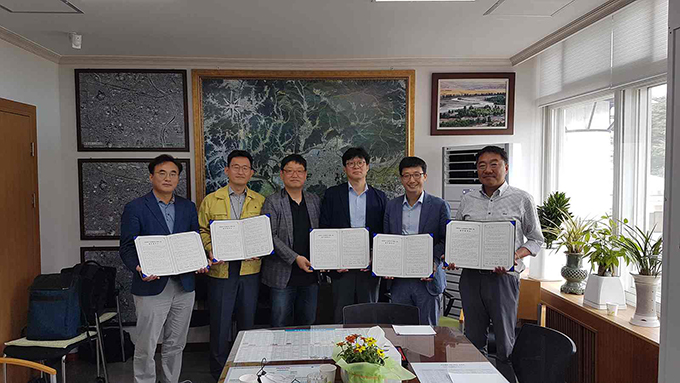-Selected as a consortium of Daegu City-Industry, Academia, and Research for '2020 Urban Regeneration-Linked Living Lab Project' by the Ministry of Science and Technology
Daegu City was selected as the Ministry of Science and ICT '2020 Urban Regeneration-related Living Lab Project' by the Daegu City-Industry-Academic-Research Consortium's'Living Lab for Building O2O (Online to Offline)-based Citizen Care and Multicultural Community Services' He said it was done.
With this project selection, Daegu City will receive a total of 2022 billion won of financial support (in total government expenditure) for three years until 3, and will promote the Urban Regeneration Project and the Living Lab Project for grafting smart technology in the original downtown area.
The '2020 Urban Regeneration-Linked Living Lab Project' of the Ministry of Science and Technology is an R&SD that develops smart technologies and demonstrates them in local governments by operating a living lab led by local governments and consortiums of industry, academia, and research centers in connection with regional urban regeneration. It's a business. 'The 2nd Comprehensive Plan for Solving Social Problems ('18.6)' Among the 41 social issues, 3 areas related to urban regeneration are covered:'Environment,''Residential Transportation', and'Energy', and 2 projects are fully funded by the government. .
Daegu City started preparing for this project in February of this year, and formed a consortium with Daegu Catholic University as the host organization, Daegu Techno Park (Daegu TP), Korea Construction & Living Environment Research Institute (KCL), and Winitech Co., Ltd.
Since last May, a 'pre-planned living lab' has been operated for 5 local residents, and while exploring the site together with local residents, they have found problems in the area and come up with ideas for solving them, and established a final business plan.
Daegu City plans to promote the business with the goal of designing a smart ecosystem and 5C (Colorful, Citizen, Care, Cultural, Community) service for local revitalization and care for residents, and'Smart Shelter' and'Smart Street Light' in the Gyeongsanggamyeong area of Jung-gu. The specific goal is to develop and install the product and commercialize related technologies and products.
The'Smart Shelter', conceived from the pavilion, a traditional shelter in Korea, is a facility that can be used in a variety of ways, such as a shelter to avoid fine dust, heat waves, extreme cold, and crime, a multicultural space for viewing various cultural contents, and a psychological counseling space. The'Smart Street Light', which is installed in connection with the'Smart Shelter', performs functions such as disaster and emergency information, tourism information, crime and accident prevention by adding CCTV and projection lights to the existing street light.
In the planning of this project, the Daegu Catholic University 'DCU Smart City Regeneration Center' centered on industry-university cooperation foundations, professors majoring in urban regeneration and software, Daegu Technopark, Korea Construction Life Research Institute, and Winitech Co., Ltd. participated with Daegu City.
Daegu Mayor Kwon Young-jin said, “This project is significant in that universities, local communities, related institutions and businesses have come together to solve the urban problem.” “This project uses smart technology to be held by our local community. We plan to solve the existing problems and make it a starting point to contribute to revitalizing the old downtown area.”
<Business Overview>
❍ Project name: Living Lab for building a multicultural community service and civic care based on O2O (Online to Offline)
❍ Target site: All of Jung-gu original city center
❍ Period/project cost: '20. ~ '22. (3 years) / 18.4 billion won (government expense 16.5, private investment 1.9)
❍ Participating subjects: Daegu Catholic University (host institution), Daegu TP, Korea Institute of Construction Living Environment (KCL), Winnitech (above participating institutions), Daegu City (request institution)
❍ Project details: Develop modular smart shelters (community platforms, multicultural spaces, etc.) and smart street lights (tourism information, crime/accident prevention, traffic safety, etc.)




